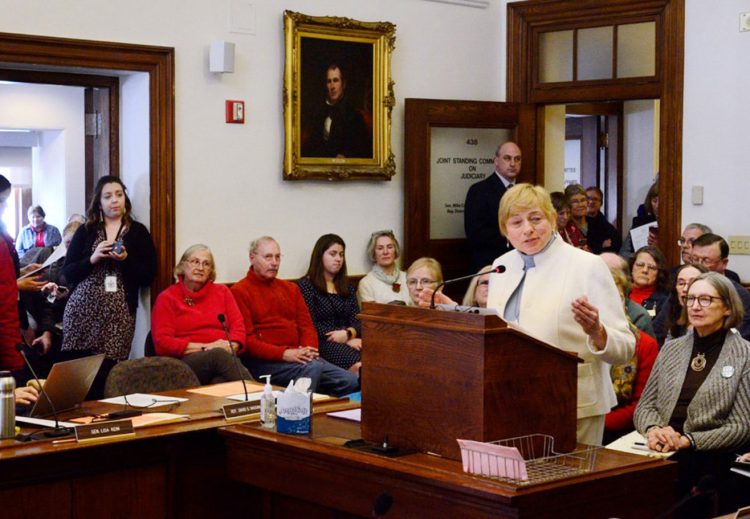AUGUSTA — An amendment to the Maine Constitution that would prohibit discrimination based on gender drew a flood of testimony during a public hearing at the State House on Thursday, as women launched a campaign to make it explicitly clear that discrimination based on sex is illegal in Maine.
“Women are equal citizens deserving equality under the law,” said Rep. Lois Reckitt, D-South Portland, the bill’s primary sponsor. “This amendment will allow us to strengthen laws related to gender and will ensure progress made is not reversed. We all believe that Maine is ‘The Way Life Should Be,’ and ensuring equality for all makes that motto much more real.”
Opponents of the legislation, including the Christian Civic League of Maine and the Roman Catholic Diocese of Maine, said the amendment would open the door for taxpayer-funded abortions, a charge supporters of the amendment reject.
“Our biggest concern with this is the unintended consequences of this legislation,” said Mike McClellan, policy director of the Christian Civic League of Maine. “When you read the bill, to me, it didn’t really say a lot. I wasn’t getting what it was really trying to accomplish.”
McClellan said his organization looked to other states that had passed an equal-rights amendment and they saw problems and concerns.
Sen. Eloise Vitelli, D-Arrowsic, the Senate sponsor of the bill, said work on equal rights was not complete in Maine or the U.S. While the federal Equal Rights Act was ratified by Maine in 1974, the federal amendment never gained ratification by enough states before the amendment expired in 1982.
But supporters have never given up, and Nevada and Illinois recently joined the 35 states that originally passed the ERA, leaving the amendment one state shy of the 38 needed for the three-fourths majority needed for it to become part of the U.S. Constitution. Should that happen, Congress also would have to repeal or overrule the 1982 deadline, which advocates say is possible because the 27th Amendment was ratified in 1992 – more than 200 years after it was approved by Congress.
Alabama, Arizona, Arkansas, Florida, Georgia, Louisiana, Mississippi, Missouri, North Carolina, Oklahoma, South Carolina, Utah and Virginia are the states that never ratified the ERA.

Rep. Lois Galgay Reckitt, D-South Portland, introduces her proposed amendment to the Maine Constitution to prohibit discrimination based on gender, on Thursday at the State House. Joe Phelan/Kennebec Journal
Regardless of whether the amendment becomes part of U.S. law, Reckitt and Vitelli want to make sure it is enshrined in the Maine Constitution.
“An equal rights clause in our constitution will make it clear that discrimination in employment, insurance, education and other areas important to women’s freedom and to our full participation in society shall not be tolerated,” Vitelli said. She and Reckitt sponsored the same bill in 2017, when Republicans held more legislative seats, but were unable to gain the two-thirds support in both the House and Senate needed to send the measure to voters.
Both lawmakers said they vowed to each other and their constituents that they would try again if they were re-elected. Reckitt, 74, said she’s determined to see Maine pass the constitutional amendment in her lifetime.
“I keep saying to people, Susan B. Anthony did not live to see the vote,” Reckitt said. “I do not intend to be the Susan B. Anthony of Maine. I want this thing passed.”
Gov. Janet Mills, also a Democrat, offered her support for the bill. Mills said even without ratification of the federal amendment, Maine needed to amend its constitution to ensure that discrimination was clearly against the law in Maine She said the amendment would assert that as a matter of state constitutional law “the principle of equal protection is worthy of preserving.”
“While our state and our nation, unquestionably, have made great progress in effectuating equal rights for women and men, those changes have been piecemeal, intermittent and impermanent,” Mills said. “Those laws which cover discrimination only in specific areas such as housing, education, credit, employment – they are ephemeral, subject to repeal or change at the whim of any particular Legislature or initiative.”
If two-thirds of lawmakers in both the House and Senate approve the legislation, it then goes to Maine voters, who would decide on final ratification in a statewide vote by voting “yes” or “no” on the following question:
“Do you favor amending the Constitution of Maine to prohibit the denial or abridgment by the State or any political subdivision of the State of equal rights based on the sex of an individual?”
Passage at referendum would require a simple majority vote, and not two-thirds.
Reckitt said she first testified before the Legislature on an equal-rights amendment in 1973. The bill failed then but passed in 1974. The state later tried to pass an amendment to its constitution in 1982 as the federal amendment had reached its 10-year deadline for ratification by two-thirds of the states in the U.S.
The Judiciary Committee’s Senate chairman, Michael Carpenter, D-Houlton, said the committee will take up the bill in the next two weeks to work on possible amendments and vote on a recommendation to the full Legislature.
Scott Thistle can be contacted at 791-6330 or at:
sthistle@pressherald.com
Twitter: thisdog
Send questions/comments to the editors.




Comments are no longer available on this story